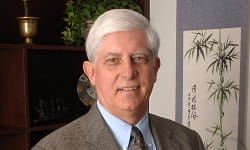
11/12/2018
 PITTSBURGH – Donald S. Burke, M.D., dean of the University of Pittsburgh Graduate School of Public Health and Distinguished University Professor of Health Science and Policy, today will receive the prestigious John Snow Award from the American Public Health Association (APHA) and the Royal Society for Public Health in England.
PITTSBURGH – Donald S. Burke, M.D., dean of the University of Pittsburgh Graduate School of Public Health and Distinguished University Professor of Health Science and Policy, today will receive the prestigious John Snow Award from the American Public Health Association (APHA) and the Royal Society for Public Health in England.
The award, which annually recognizes an outstanding scientist for excellence in epidemiologic practice or research, will be presented to Burke in San Diego at the 2018 APHA Annual Meeting & Expo.
“Over the course of my career, it has been my great good fortune to work with extraordinary colleagues at the world’s leading centers of epidemiology, not only at the University of Pittsburgh, but at the Walter Reed Institute of Research, Harvard and Johns Hopkins. This award is as much a testimony to these great institutions as it is to me personally,” said Burke, who also holds the Jonas Salk Chair of Population Health at Pitt. “I find great personal satisfaction in the knowledge that my life-long research efforts have helped to improve the health and well-being of mankind.”
Awardees are chosen for their contributions to the improvement of human health or substantial reduction in burden of disease through innovations in public health practice, based on clear epidemiologic foundations or implementation of epidemiologic approaches to the solution of health problems. Their contributions are practical, explicit and applied, rather than theoretical or implicit.
Several experts in the field of epidemiology signed a nomination letter recommending Burke for the award, citing his work as “essential in driving the appropriate use and knowledge about vaccines to public health and planning,” and saying his recent effort on the opioid epidemic “demonstrates the value of epidemiologic methods as the foundation of public health practice and prevention.”
“This award, one of the oldest in the field, is given in recognition of enduring contributions to public health through epidemiologic methods and practice,” said Tiffany Gary-Webb, Ph.D., M.H.S., chair of the awards committee and chair-elect of the APHA Epidemiology Section. “Dr. Burke’s research and leadership in the profession are fine examples of the ideals embodied in the Snow Award.”
The Snow Award is one of the oldest in the field of epidemiology. It commemorates John Snow, a physician who practiced in 19th century Britain and is credited as one of the founding fathers of epidemiology, which is the branch of medicine that deals with the spread and control of diseases. Snow used disease data and mapping to determine that a cholera outbreak in London was associated with contaminated water from a public water pump. He convinced authorities to stem the outbreak by removing the handle from the pump.
Burke has studied prevention and control of infectious diseases of global concern. He developed the first diagnostic tests for HIV/AIDS, proved the efficacy of a vaccine against Japanese encephalitis virus, helped to develop the first hepatitis A vaccine, laid the groundwork for a successful HIV/AIDS vaccine trial, guided dengue vaccine development and studied emerging viruses among bush-meat hunters in the Congo jungle.
At Pitt, Burke has led the development of computational models and simulations of epidemics to evaluate prevention and control strategies. In 2013, he led the creation of Project Tycho, digitizing 125 years of disease data and revealing in the New England Journal of Medicine that an estimated 100 million cases of serious childhood contagious diseases have been prevented due to the introduction of vaccines.
For the last several years, he has brought Pitt Public Health’s research prowess to bear in battling the opioid epidemic, and the school has recently been awarded state and federal grants to develop data dashboards and models of potential solutions to reverse the overdose epidemic. In research published recently in Science, he and his team mapped and forecast the epidemic growth of drug overdose deaths in the U.S.
Burke served on active duty in the U.S. Army for 23 years, leading military infectious disease studies at the Walter Reed Army Institute of Research. He lived six years in Thailand conducting disease research at the Armed Forces Research Institute of Medical Sciences in Bangkok, worked extensively in Cameroon, and led major international research projects in South Africa, India, China and other countries. He retired from the Army at the rank of colonel.
Burke received his B.A. from Western Reserve University and his M.D. from Harvard Medical School. He was an intern and resident in medicine at Boston City and Massachusetts General hospitals and trained as a research fellow in infectious diseases at Walter Reed Army Medical Center.
PHOTO INFO: (click image for high-res version)
Credit: University of Pittsburgh
Caption: Donald S. Burke, M.D.
















